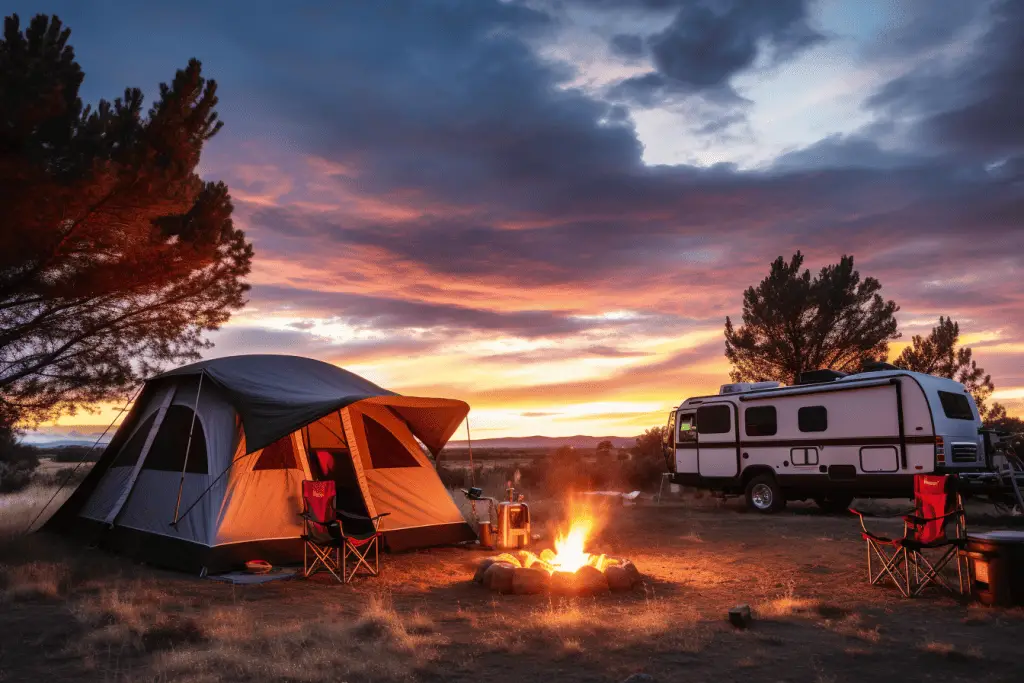Tent camping spots can be found all over the place in wilderness and rural areas. But when you’re looking to tent camp in or near the city, RV spots might be your only camping option. This leads a lot of people to ask, can you tent camp in an RV campsite?
Many RV campsites do allow tent camping both with and without an RV. However, not all RV spots are suited for tent camping and some campground owners won’t even allow it.
So how do you know whether or not an RV campsite is suitable for camping? Let’s take a deeper look.

RV Sights That Aren’t Good for Tent Camping
One of the primary issues with tent camping in an RV site is the fact that some RV campsites are just concrete pads. This means you won’t be able to put any tent stakes into the ground.
Also, setting your tent up on a slab of concrete is a great way to end up with a tent bottom full of small holes and tears. Even if your tent bottom isn’t damaged by camping out on the concrete, you may find that it just isn’t very comfortable.
If you’re still dead set on tent camping in this kind of environment, there are a few steps you can take to make it work.
How to Tent Camp on Concrete
Firstly, you’ll want to have a method for staking your tent down into place. One way to do this might be to bring some sandbags that you could place your guy lines under.
Another method might be to skip the traditional tent and go with a tent that doesn’t need to be staked down. Some examples of this might be a rooftop tent, a tent cot, a low lying bivy tent, or even a hammock with its own hammock stand.
The next thing you’ll have to worry about is the safety of your tent. Go with a traditional tent and you’ll have to find a way to protect the bottom of your tent from the rough concrete. A tent footprint or even a large tarp in dry weather can help with this.
Of course, you’ll also have to worry about comfort. Concrete can get extremely hot and extremely cold. Protect yourself from these temperature swings by bringing along a camping cot or at least a camping pad.
| Challenges | Description |
|---|---|
| Unsuitable Grounds | Many RV sites are designed with concrete pads, making it impossible to stake a tent. |
| Potential Tent Damage | Concrete surfaces can puncture or tear the bottom of a tent. |
| Comfort Concerns | Camping on concrete can be uncomfortable due to its hardness. Additionally, concrete can become extremely hot or cold. |
| Noise from Neighboring RVs | RVs might run loud generators or air-conditioners, which can be disruptive for tent campers. |
| Lack of Natural Environment | RV sites, especially in urban areas, may not offer the same natural environment or scenic views that wilderness tent sites do. |
| Proximity to Other Campers | RV sites are often closer together, providing less privacy than secluded tent sites. |
| Policy Restrictions | Some RV sites may have strict policies against tent camping or might charge the same rate for tents as they do for RVs, which can be more expensive for tent campers. |
| Less Ground Insulation | Concrete doesn’t provide the same insulation as natural ground, making it more susceptible to temperature changes. |
RV Campsites and Their Tent Camping Policies
Another thought you might want to keep in mind is that some RV sites won’t let you tent camp. Be sure to contact the campground before you make any assumptions. It would be terrible to get to your campsite, only to find that you aren’t allowed to stay there.
My advice would be to try to email the campground in advance. This way, if you show up and they say that you aren’t allowed to tent camp there, you’ll at least have email proof that you were told you could.
The Downside of Tent Camping Amid RVs
Tent campers are usually quiet while RV campers aren’t. This is because RVs will often have air conditioning systems and large generators.
These AC units and RV generators are loud. This isn’t a big deal when two RVs park next to each other because the RVers have hard walls and insulation to dampen the sounds. When you’re parked in a tent next to them, you won’t have that luxury.
The Benefits of Tent Camping in An RV Site
Tent camping in an RV site isn’t all bad. In fact, you’ll find that there are a few benefits of doing so.
For starters, most RV campsites are modern sites with electrical hookups. Bring an extension cord and you’ll often be able to take advantage of this feature. Take along an extension cord and a power strip and you’ll be able to charge phones, operate laptops, and even make coffee all while hanging out in your tent.

RV sites will usually have water as well. Bring a travel Berkey to fill up and you’ll have safe and great-tasting water right at your campsite.
On top of this, many RV sites will have luxury amenities for you to enjoy. You’ll probably have access to a pool, a fitness center, a wifi cafe, and even a general store.
The kids may have access to playgrounds and onsite arcades. In some RV parks, you and your dogs will have access to a dog park.
Another advantage of tent camping in an RV site is that RV campgrounds will often have some form of security. This may come in the form of a front gate or even a 24-hour security guard.
Final Thoughts
Tent camping in an RV site can be challenging but it is possible and it does have its advantages. Some people even prefer it over more rustic camping.
Either way, you’re camping and that’s always a great thing!

